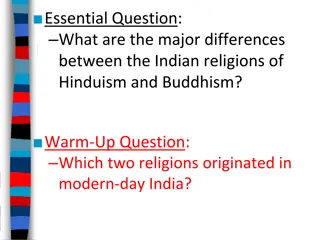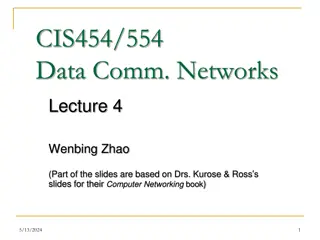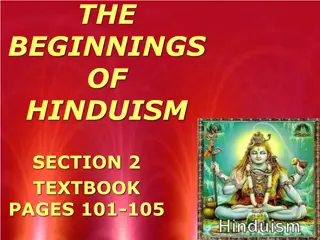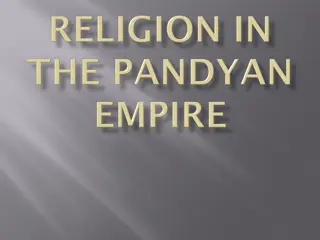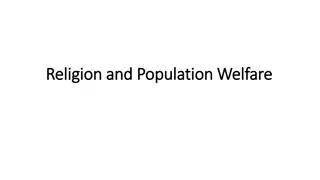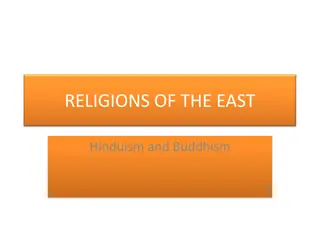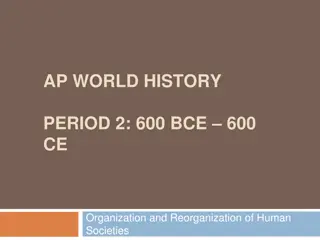
Origin and Beliefs of Hinduism: Insights into the Ancient Tradition
Discover the origins of Hinduism, its foundational beliefs, social structure, concept of Karma, and the significance of Brahman. Explore how Hinduism originated near the River Indus in India, the caste system it follows, and the concept of reincarnation through Karma. Learn about Brahman, the unchanging reality in Hindu philosophy.
Download Presentation

Please find below an Image/Link to download the presentation.
The content on the website is provided AS IS for your information and personal use only. It may not be sold, licensed, or shared on other websites without obtaining consent from the author. If you encounter any issues during the download, it is possible that the publisher has removed the file from their server.
You are allowed to download the files provided on this website for personal or commercial use, subject to the condition that they are used lawfully. All files are the property of their respective owners.
The content on the website is provided AS IS for your information and personal use only. It may not be sold, licensed, or shared on other websites without obtaining consent from the author.
E N D
Presentation Transcript
http://www.anthemis.nl/beeldaromaethol/lotus.jpg Web Quest Hinduism Web Quest Hinduism Jamilla Ardon & Lotte van den Heuvel 4AA
Where did Hinduism Where did Hinduism originate? originate? The origin of Hinduism lies in India, near the river Indus, which now belongs to Pakistan. The Indians called their belief Dharma; eternal order or truth. Hindu is Persian for Indian, that s why the belief is called Hinduism. This also proves that Hinduism did originate in India.
When was Hinduism founded? When was Hinduism founded? We re not absolutely sure when Hinduism was founded, because there s no exact date. Because of some archaeologists, we suspect that about 4000-5000 years ago, some people already believed in Hinduism. This picture shows the oldest Hindu temple in the world. File:Subrahmanya Temple Saluvankuppam.jpg
What type of social What type of social structure is followed in structure is followed in Hinduism? Hinduism? In India, the caste system is the base of the social structure, also called the varna and jati system. Varna divides people in 4 different castes, the jati divides people in sub-castes. Because many Hindu's live in India, they are also part of this system.
How is a persons social How is a person s social status determined? status determined? You belong to a certain caste when your family is part of it. Your birth therefore decides your social status, for example; you are born in a family with teachers, then you belong to the Brahmins.
What is Karma? What is Karma? Karma comes from Hinduism and Buddhism. It means that what you do will have consequences for you. In Hinduism, people believe in reincarnation and they believe that what you do in this life will determine what your next life will look like.
File:Wassertropfen.jpg What is Brahman? What is Brahman? Brahman is the term for the unchanging reality amidst and beyond the world which cannot be exactly defined. It s the highest reality for Hindu s, it is that what you can t change. Brahman was founded by a philosopher called Shankara in the year 800 (approximately). The picture at the top shows a drop water in water, a common analogy for Brahman.
What is the ultimate goal in What is the ultimate goal in Hinduism concerning Hinduism concerning reincarnation? reincarnation? The ultimate goal is called moska; salvation from samsara. Samsara is the endless reincarnation cycle. In order to do that, the people have to become one with the universal soul and debar all desires on earth.
Is Hinduism mono Is Hinduism mono- - or polytheistic? polytheistic? or Hinduism can be considered as both mono- and polytheistic. Hindu s have many gods and goddesses, but some people say that they re all different forms of one god. Others say that all gods and goddesses are different. So there are mono- and polytheist ic Hindu s.
What is the symbolic What is the symbolic meaning of Aum ? meaning of Aum ? Aum consists out of 3 letters and it s symbolic for 3 triads: Worlds: earth, atmosphere, heaven Major Hindu gods: Brahma, Shiva, Vishnu Vedic scriptures: Rg, Yajur, Sama Aum can also be described as the essence of the entire universe .
What is Henotheism (in What is Henotheism (in Hinduism)? Hinduism)? In Henotheism, there are multiple gods and goddesses, but one of the is the leading one. Subtypes are monolatrism or kathenotheism. The founder of Henotheism, Max M ller, said that Hinduism is a Henotheist religion too. The picture shows Henotheist ideas in Christianity. >
Brahma Brahma Brahma is the personification of the holy trinity in Hinduism. He is said to have come out of Vishnu s umbilicus. Brahma is also related to Brahman/Aum, the creator of everything and the student of the Veda s. Brahma is described as a male god with four faces.
Shiva Shiva Shiva is worshipped as the supreme God. He is the destroyer and restorer and is the most multifaced God of all hinduist Gods. Shiva belongs to the Trimurti, together with Brahma and Vishnu. Together with the godess Parvati, Shive stands for true love.
Vishnu Vishnu Vishnu rules the balance between good and evil and stands for the protector of the universe. There also exists a group of people that only worship Vishnu; the monotheism Vaishnavism. Hinduist say Vishu has reincarnated 9 times and he will do so once again, close to the end of the world.
Durga Durga Durga is the Mother Godness. Durga is also the power behind the creation, protection and destruction of the world. She is worshipped as the Supreme Power and, according to some, Durga is the wife of Shiva. Durga has 3 eyes representing the moon, the sun and fire (desire, action and knowledge).
Sources Sources http://www.scholieren.com/werkstuk/13610 http://www.geloofik.nl/Hindoeisme/geschiedenis.htm http://www.hindupedia.com/en/Social_Structure http://uwacadweb.uwyo.edu/religionet/er/hinduism/HORGS.HTM http://www.running-down.com/2011/02/new-boston-marathon-registration-system.html http://nl.wikipedia.org/wiki/Karma http://www.sanatandharm.net/library/BasicKnowledgeDetail.php?id=127 http://nl.wikipedia.org/wiki/Brahman_(filosofisch_concept) http://en.wikipedia.org/wiki/Brahman http://en.wikipedia.org/wiki/File:Subrahmanya_Temple_Saluvankuppam.jpg http://en.wikipedia.org/wiki/Hindu_temple http://epress.anu.edu.au/austronesians/precedence/mobile_devices/ch03s02.html http://curiosity.discovery.com/question/goal-hindu-religion-relate-reincarnation http://antaryamin.wordpress.com/2012/07/08/americans-wonder-if-they-are-all-hindus-now/ http://en.wikipedia.org/wiki/Monotheism http://nl.wikipedia.org/wiki/Hindoe%C3%AFsme#God.2Fgoden_en_filosofie http://www.religionfacts.com/hinduism/symbols/aum.htm http://wakpaper.com/id31450/pics-aum-wallpapers-free-hindu-om-religious-1152x864-pixel.html http://nl.wikipedia.org/wiki/Henothe%C3%AFsme http://en.wikipedia.org/wiki/Henotheism http://www.bible.ca/trinity/trinity-definition-god-watchtower-JW-henotheism.htm http://nl.wikipedia.org/wiki/Brahma_(hindoe%C3%AFsme) http://theworldofhindus.blogspot.nl/2012/11/brahma-neglected-creator.html http://www.hindudevotionalblog.com/2011/10/lord-shiva-hindu-god-siva.html http://allhindugodgoddess.blogspot.nl/2010/08/hindu-lord-vishnu-images.html http://www.bbc.co.uk/religion/religions/hinduism/deities/vishnu.shtml http://hamaracd.com/hcdinternational/asp/DurgaPuja.asp http://hinduism.about.com/od/hindugoddesses/a/durga.htm


